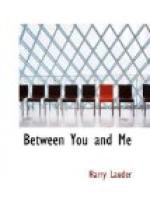No Scots, I say! But what audience ha’ I e’er seen that didna hae its sprinklin’ o’ gude Scots? I’ve sang in ‘most every part o’ the world, and always, frae somewhere i’ the hoose, I’ll hear a Scots voice callin’ me by name. Scots ha’ made their way to every part o’ the world, I’m knowin’ the noo, and I’m sure of at least ane friend in any audience, hoo’ever new it be to me.
So, o’ coorse, there were some Scots in that audience at Birkenhead. But because in that Mersey town most of the crowd was sure to be English, wi’ a sprinkling o’ Irish, the management had suggested that I should leave out my Scottish favorites when I made up my list o’ songs. So I began wi’ a sentimental ballad, went on wi’ an English comic song, and finished with “Calligan-Call-Again,” the very successful Irish song I had just added to my list.
Ye’Il ken, mebbe, if ye’ve heard me, that I can sing in English as good as the King’s own when I’ve the mind to do it. I love my native land. I love Scots talk, Scots food, Scots—aweel, I was aboot to say something that would only sadden many of my friends in America. Hoots, though mebbe they’ll no put me in jail if I say I liked a wee drappie o’ Scottish liquor noo and again!
But it was no a hard thing for me not to use my Scottish tongue when I was singing there in Birkenhead, though it went sair against ma judgment. And one nicht, at the start of ma engagement, they were clamorous as I’d ne’er seen them sae far south.
“Gi’es more, Harry,” I heard a Scottish voice roar. I’d sung my three songs; I’d given encores; I was bowing acknowledgment of the continuing applause. But I couldna stop the applauding. In America they say an artist “stops” the show when the audience applauds him so hard that it will not let the next turn go on, and that was what had happened that nicht in Birkenhead. I didna want to sing any of ma three songs ower again, and I had no main that waur no Scottish.
So I stood there, bowing and scraping, wi’ the cries of “Encore,” “Sing again, Harry,” “Give us another,” rising in all directions from a packed house. I raised ma hand, and they were still.
“Wad ye like a little Scotch?” I asked,
There was a roar of laughter, and then one Scottish voice bawled oot an answer.
“Aye, thank ye kindly, man Harry,” it roared. “I’ll tak’ a wee drappie o’ Glenlivet——”
The house roared wi’ laughter again, and learned doon and spoke to the orchestra leader. It happened that I’d the parts for some of my ain songs wi’ me, so I could gie them “Tobermory” and then “The Lass o’ Killiecrankie.”
Weel, the Scots songs were far better received than ever the English ones or the Irish melody had been. I smiled to mysel’ and went back to ma dressin’ room to see what micht be coming. Sure enough ’twas but twa-three meenits when the manager came in.
“Harry,” he said, “you knocked them dead with those Scotch songs. Now do you see I was right from the start when I said you ought to sing them?”




